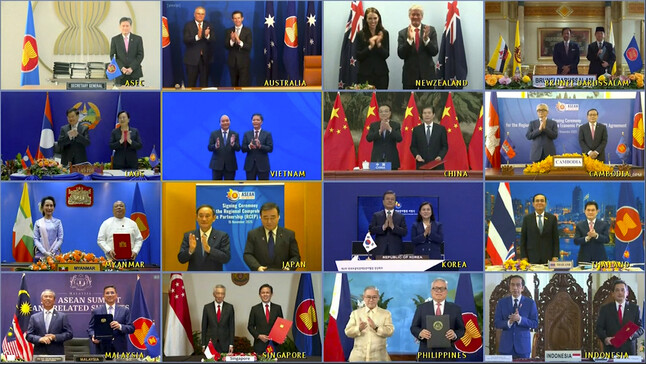The biggest trade block is born
Quote from Ndubuisi Ekekwe on November 16, 2020, 10:51 AM
The biggest trade block is born. But notice that India cut itself off. Africa is working on one - AfCFTA.
Fifteen Asia-Pacific countries signed the Regional Comprehensive Economic Partnership (RCEP) Sunday, forming the world's biggest trade bloc. The deal brings together Southeast Asia, China, Japan, South Korea, Australia and New Zealand — or a third of the world's population — to lower tariffs and promote trade and investment in the region. First proposed in 2012, the deal is absent India, which withdrew on fears that local industries would be hurt by imports. It also does not include the US, which in 2017 left the Trans-Pacific Partnership, another Asia-focused mega agreement.
Here’s how the Regional Comprehensive Economic Partnership breaks down:
- 15: Countries the deal covers
- 2.2 billion: People who live in those countries
- >$26 trillion: Combined GDP of the nations included in the RCEP
- 8: Years the deal was under negotiation
- 92%: Proportion of goods traded between participating countries that could see a reduction in tariffs

The biggest trade block is born. But notice that India cut itself off. Africa is working on one - AfCFTA.
Fifteen Asia-Pacific countries signed the Regional Comprehensive Economic Partnership (RCEP) Sunday, forming the world's biggest trade bloc. The deal brings together Southeast Asia, China, Japan, South Korea, Australia and New Zealand — or a third of the world's population — to lower tariffs and promote trade and investment in the region. First proposed in 2012, the deal is absent India, which withdrew on fears that local industries would be hurt by imports. It also does not include the US, which in 2017 left the Trans-Pacific Partnership, another Asia-focused mega agreement.
Here’s how the Regional Comprehensive Economic Partnership breaks down:
- 15: Countries the deal covers
- 2.2 billion: People who live in those countries
- >$26 trillion: Combined GDP of the nations included in the RCEP
- 8: Years the deal was under negotiation
- 92%: Proportion of goods traded between participating countries that could see a reduction in tariffs
Share this:
- Click to share on Facebook (Opens in new window) Facebook
- Click to share on X (Opens in new window) X
- Click to share on WhatsApp (Opens in new window) WhatsApp
- Click to share on LinkedIn (Opens in new window) LinkedIn
- Click to email a link to a friend (Opens in new window) Email
- Click to print (Opens in new window) Print

